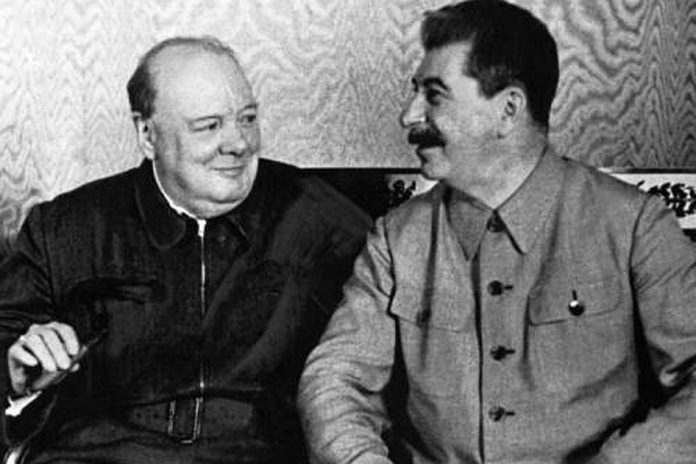
History 18/03/20 What Churchill said about the battle of Stalingrad
In early 1943, the entire world press wrote about the Soviet Union’s victory in the battle of Stalingrad. About the heroism of Russian talking everything from Mao Zedong to Winston Churchill. Remember, as evaluated by the battle of Stalingrad foreign politicians and historians.
Winston Churchill
during the talks at the Tehran conference of November 29, 1943 Winston Churchill stated: “the Stalingrad became a symbol of courage of the Russian people and together with the symbol of the greatest human suffering. This symbol will remain for centuries. It is necessary that future generations could see and feel all the greatness of the Volga won the victory and all the horrors of the raging war of extermination there. It would be good to leave untouched the terrible ruins of this legendary city, and next to build a new, modern city. The ruins of the Stalingrad-like ruins of Carthage, would forever remain a monument to human endurance and suffering. They would have attracted pilgrims from all ends of the earth and would serve as a warning to future generations…”
Hessler
an Interesting evaluation of Stalingrad Western historians and publicists of the Cold war. Their aggressive moves against the Soviet Union rested in an objective assessment of the inability of the West to resist the state, victorious in the battle of Stalingrad. In the book “Operation survival”, published in 1949 and written by the famous American writer Hessler, which is difficult to suspect of Pro-Russian positions, stated: “the assessment is very realistic scientist Dr. Philip Morrison, it would take at least 1000 atomic bombs to cause damage to Russia caused only in one of the Stalingrad campaign… This is much more than the number of bombs that we have accumulated after four years of relentless effort.”
General de Gaulle
If you visit the memorial in Stalingrad, de Gaulle walkedsmiling stock phrases, noting “the role of the allies” in the battle of Stalingrad, which was just weird. The General said: “I want to pay tribute to Stalingrad, and the lesson he gives us. Stalingrad is not only a symbol of victory, it is a great lesson that can make allies, banding together against the hated Germany. Never in the future Germany will not be able again to take up arms against the democratic countries.”
Distinguished de Gaulle already at a reception in Moscow. A Western correspondent asked the French General to share their experiences about Stalingrad. “Ah, Stalingrad, said de Gaulle — Yes, powerful people, great nation”. The correspondent agreed: “of Course, the Russian…” De Gaulle angrily interrupted him: “I’m not talking about the Russian and the Germans. How they managed to get this far!” Like Churchill said, “no comment.”
the Joffrey Barricklow
One of the most prominent British historians of the twentieth century, Professor Joffrey of Barricklow, in 1955 published the book “History in a changing world”. The author gives a Mature and sober judgment about the battle of Stalingrad: “I started my research, convinced that the Russian victory at Stalingrad in 1943, forces to reconsider the history of Europe… If we took the shock of Stalingrad to understand the limitations of our Western historiography, it only happened because the political prejudices that underlie our Western historical science has blinded us as to the true correlation of forces in 1943”.
Roosevelt
Franklin Roosevelt, the US President, responded to the victory in the battle of Stalingrad adequately, he was sent to Stalingrad the letter, the text of which read: “on behalf of the people of the United States of America I present this letter to the city of Stalingrad to commemorate our admiration for his valiant defenders, courage, fortitude and dedication that during the siege of September 13, 1942 to January 31, 1943 will forever inspire the hearts of all free people. Their glorious victory stemmed the tide of invasion and was a turning point in the war the Allied Nations against the forces of aggression.”
Mao Zedong
10 October 1942, Mao Zedong wrote an article “the Turning point of the war.” The Stalingrad battle is not over, but the “great helmsman” have noted the crucial role of Stalingrad: “There is something in common between the defense of the city of Stalin, the Red Army defended for forty-eight days, and the defence of Moscow last year. It is a common is that the defense of Stalingrad thwarted Hitler’s plans for the current year as well as the defense of Moscow broke its last year’s plans. In short, Hitler remains only one way – to the grave. Political life of Napoleon ended at Waterloo, but it was predetermined by its defeat in Moscow. Now Hitler is on the path of Napoleon, and the battle of Stalingrad predetermines his death.Anyone who appreciates the international stop pessimistic, needs to change their point of view.”
Hassel
Finally, an assessment of the role of the battle of Stalingrad the German diplomat Hassel. In mid-February 1943, he noted in his diary: “the Last few weeks are characterized by the most serious crisis that we have not yet experienced in the war. This crisis, unfortunately, struck the whole of Germany. It is symbolized by one word – Stalingrad.”
Russian Seven
Source:
© Russian Seven
Featured articles Share: Comments Comments on the article “What Churchill said about the battle of Stalingrad” Please log in to leave a comment! br>
Share on Tumblr
















